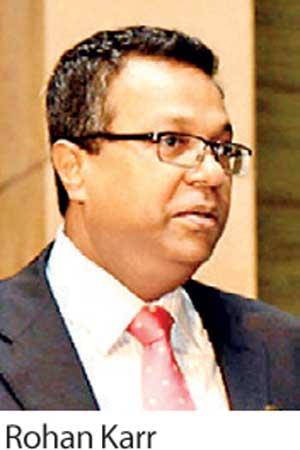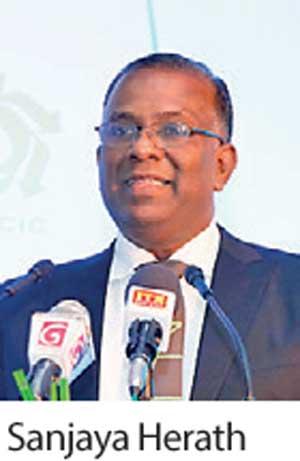09 Sep 2019 - {{hitsCtrl.values.hits}}
 By Nishel Fernando
By Nishel Fernando
Sri Lanka’s tea industry stakeholders were urged to create a common platform quickly to make a paradigm shift to revive the struggling 150-year old industry by committing to the globally recognised Ceylon Tea brand, its core values and its brand promise, prior to promoting Ceylon tea in the global marketplace.
“If we promote what we have now and the message is negative, we are only going to expand the negativity to a wider audience. Therefore, we should probably evaluate and use the right time for investment and promotion,” veteran hotelier and head of Hayley’s leisure segment, Rohan Karr cautioned industry stakeholders.
He made these remarks delivering the keynote speech at the 20th Annual General Meeting of the Tea Exporters Association (TEA) in Colombo last Friday. He pointed out that there is no brand consistency in utilising the current Ceylon Tea brand name and its logo while some tea producers have already shied away from it.
As long as industry stakeholders fail to come together to share a common brand with its vales and a brand promise, Karr stressed that Ceylon Tea continues to lose its market share while failing to get a premium price for the tea, which is known to be the purest, cleanest and finest tea in the world.
“We have to come together for a paradigm shift in the way we do business and the way we think about tea. First, we need a roadmap for recovery and then we need a road map for development. The recovery has to be in all the segments from planting to drinking.
“Is Ceylon Tea a brand name or destination origin? I don’t think anyone knows the answer. Maybe, we need to collectively agree on what’s our brand.
“Branding will give a meaning to our tea by creating and shaping a brand that attracts and retains loyal customers and increase our market share,” he said.
Karr noted that tea export volumes have declined by 10 percent from 2014 to 2018 while Kenya has successfully penetrated Sri Lanka’s traditional tea export markets as well as fastest growing markets.
“Kenya is in all top ten tea importing markets while Sri Lanka is only in five of them. We are only in one of the fastest growing markets and Kenya is in all four of them. However, we are present in four of the declining tea markets and Kenya is in only two of them.
“I feel we haven’t evolved, and that is one of the reasons to be in this situation. We haven’t evolved in plucking tea; we haven’t evolved in going to markets where a massive growth is taking place. We have been coming down and we are in mediocre tea business now,” he elaborated.
Karr drew his attention to the fact that there’s a trend on focusing on quantity over quality in Sri Lanka’s tea industry.
“I heard that the production, which was used to be two leaves and a bud is shifting to four leaves and bud right now by compromising quality. If we carry on like this, it will be soon a tree and a bud,” Karr quipped.
“Is Ceylon Tea still the clearest, finest and the purest? There are credibility issues when it comes to Germany and Japan. They check the quality and purity of tea. We are losing some of the advantages we had in this segment as well,” he noted.
Karr also strongly advised against changing the brand name to Sri Lanka Tea while pointing out that Ceylon Tea has acquired significant brand equity in the world.
“I heard about Ceylon Tea moving into Sri Lankan Tea. It is again lame advice. Who are we kidding? Why do we have to move away from Ceylon Tea to Sri Lankan Tea. Ceylon Tea has massive brand equity right now. Don’t change it because the name doesn’t suit the country,” he stressed.
Karr pointed out that all stakeholders in the tea industry would benefit by committing to a common brand and its embedded promises and values. “There are so many different tea brands and all are promoting their brands. If we have one brand with sub-brands, it’s easy to promote and advertise. It’s easy for brand communication and brand marketing.
“Brand communication touches the people before tea does. They start believing in the brand by purely understanding for what the brand stands for rather than tasting a cup of tea in the first place,” he added.
Meanwhile, Karr welcomed the formulation of a roadmap for the Ceylon Tea industry initiated by the Colombo Tea Traders’ Association (CTTA), but with a cautionary note.
“I came to know that the Tea Board of India is also having a roadmap on a 12-point agenda. So let’s make sure when Ceylon Tea comes up with a roadmap, we have some milestones and goals that could not be compromised by the Indian Tea Board’s roadmap.
“You need to work on the roadmap by pledging that whatever happens there won’t be any deviation from brand values, personality promises, pillars and positioning.
“We need some great and unselfish leaders, thinkers and strategists to get into a room and put personal interest’s aside and create a roadmap for Ceylon Tea to drive recovery first and then success in years to come,” he advised.
Tea lab to be set up with Japanese assistance
 Sri Lanka’s tea exporters and the Plantation Industries Ministry are to jointly set up the country’s first internationally accredited, fully-fledged tea laboratory with the assistance from the Japanese government.
Sri Lanka’s tea exporters and the Plantation Industries Ministry are to jointly set up the country’s first internationally accredited, fully-fledged tea laboratory with the assistance from the Japanese government.
“We are handicapped without internationally accredited laboratory facilities to test the quality of the produce.
“We, The Tea Exporters Association (TEA) through the Sri Lanka Tea Board (SLTB) and the Ministry of Plantations Industries are pursuing the setting up of a fully-fledged testing facility in Sri Lanka in the near future,” Tea Exporters’ Association’s (TEA) newly appointed Chairman Sanjaya Herath said.
He revealed that the Japanese Ambassador to Sri Lanka, Akira Sugiyama on behalf of the Japanese Government agreed to support Sri Lanka in setting up this facility.
Sri Lanka’s tea industry is currently relying on laboratory facilities in India, Germany and Vietnam due to the absence of accredited labs in Sri Lanka, which is time-consuming and costly.
Elaborating his priorities during his tenure as the TEA Chairman, Herath emphasised that TEA will take measures to expedite the process of obtaining the geographical indication (GI) for Ceylon Tea.
“One of the other major projects we want to undertake is to fast track the obtaining of GI status for Ceylon Tea in order to realise the full potential of our tea. It’s very unfortunate that we cannot take any action against the packers using the name Ceylon in packs which are produced out of our country,” he stressed.
Moreover, he noted that TEA would also push forward the efforts to fully automate the entire process to eradicate corruption and malpractices in all quarters.
Herath also shared his intentions to work closely with the Tea Research Institute on research and development, to develop commercially-oriented aspects for the tea industry.
The tea industry contributes approximately 14 percent to Sri Lanka’ total export revenue, and it is the second largest merchandise foreign exchange earner contributing 65 percent to the agriculture export income of the country.
Further, estimated 10 percent of the total population depends on the tea industry fort their livelihoods.
12 Nov 2024 9 hours ago
12 Nov 2024 12 Nov 2024
12 Nov 2024 12 Nov 2024
12 Nov 2024 12 Nov 2024
12 Nov 2024 12 Nov 2024